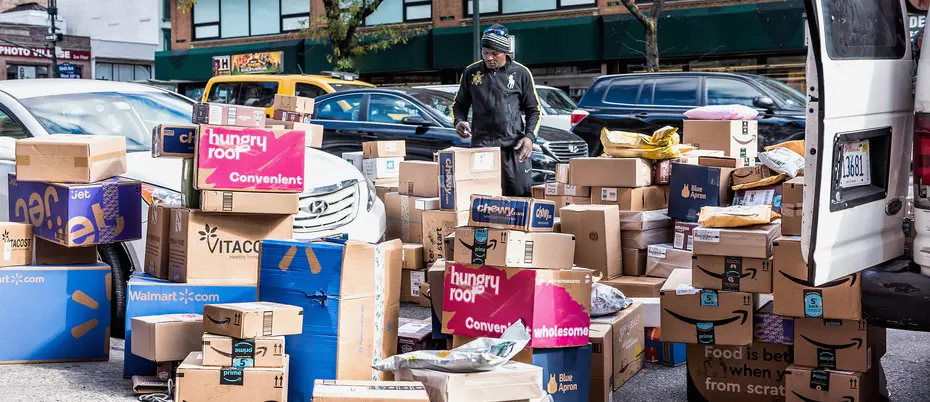Supply Chain
Startups jostle local governments for control of the urban curb
Mobility and transportation services are duking it out to dominate ‘last mile’ deliveries. Partnering with public entities can yield the right of way.
By 2050, two-thirds of the world’s population will live in cities. As populations swell, so will curb congestion.
Retail giants such as Amazon and Walmart promise speedy door-to-door delivery but require curb space for drop-offs. Ride-hailing companies such as Uber and Lyft complicate commute spaces; so do scooters, dockless bike shares, and car-sharing services such as LimePod. Meanwhile, decaying infrastructure and deferred maintenance strain public transportation systems, leaving commuters stranded on city sidewalks.
How can public and private entities collaborate to manage the city curb? A recent Sustainability Summit at MIT brought together public- and private-sector transportation leaders to offer a road map for the future. Here’s what mobility and delivery entrepreneurs, city officials, and regional planners should know.
Government and tech keep one another in check
It’s important for startups to realize that government is not the enemy of innovation and that some pushback is essential.
“The fact that there's tension between tech and government, or between public and private, is exactly as it should be,” said Seleta Reynolds, general manager of the Los Angeles Department of Transportation. “If there weren't any tension between those two sectors, I think we'd have a real problem. That's when you start to flirt with things like collusion and price-fixing,” she warned.
Ultimately, Reynolds said, tech and government each offer checks and balances. The private sector, she said, is good at “playing the short game” — reacting nimbly and iterating quickly on problems. Government, on the other hand, moves more slowly, but provides guardrails and a framework for innovation.
“When we think government, we think safety, reliability, fairness, accessibility. Those are all priorities that the private sector doesn't think about very much. It's not really in their nature, and so there’s an important role the government plays in terms of making sure things don't get off track,” said Clara Brenner, MBA ’12, co-founder and managing partner of the Urban Innovation Fund, a San Francisco-based venture capital firm that invests in transportation startups.
Instant delivery isn’t the holy grail
In addition to playing nice with government, companies should think twice about instant delivery services.
The rollout of one-day delivery by companies such as Walmart and Amazon has led to greater traffic and congestion, higher emissions, and more woes for city planners. Josue Velazquez-Martinez is the executive director of MIT’s Supply Chain Management master’s program and director of the Sustainable Logistics Initiative. He cites MIT-led research showing that consumers are actually willing to wait longer for products when they understand the environmental impact of quick delivery.
“[Customers] need to be given an environmental statement in an understandable way: The energy required to deliver your product very fast might be equivalent to killing 1,000 trees, but if you are willing to wait, you can actually save approximately 50 trees per day. Those things have proven to be very impactful to drive consumer behavior. Understanding this element and educating consumers is a key thing that we believe, in the best-case scenario, is going to really help this challenge,” he said.
Risk-taking governments are a pre-launch ally
Not every city is delighted by new ideas. In fact, Brenner cautioned that many cities, such as San Francisco, now have what she calls “innovation fatigue.”
Balancing that out, other cities are eager to be perceived as innovators.“It’s important for any entrepreneur starting out to take the time to map out competitors, your specific space, and relevant regulatory bodies. Who's going to be excited about your business, and who's going to be concerned about your business?” Brenner said. “We talk a lot with our entrepreneurs about how cities are much more aware of the implication of mobility and delivery businesses than they were when Lyft and Uber were just getting off the ground.”
If government has a right to be cautious, it also has the responsibility to take risks, too.
“Try to be agile. Pilot. It is OK to fail,” said Rich Davey, associate director of public sector consulting at Boston Consulting Group and the former transportation secretary for the Commonwealth of Massachusetts. Davey noted that he once suggested banning baby strollers on buses in Boston — not his most popular idea, but definitely outside-the-box thinking.
One problem: “There's no reward for innovation in government,” said LA’s Reynolds. “I think that we should be less defensive and precious about the funding, financing, and governance structures that got us to where we are in the first place, which have a chilling effect on thoughtful risk-taking.”
Decision-makers are people, too
Brenner often sees startup founders describe governments as monolithic. But in order to get an idea off the ground, it’s crucial to see decision-makers as human beings.
“Cultivating a productive relationship, or at least not combative, with those individuals is very important. At the end of the day it’s individuals who are making these decisions. It’s not some ‘monolithic government,’ as much as I think you hear a lot of startup founders describe it as such,” Brenner said.
To that end, a certain amount of networking savvy is essential for entrepreneurs. Getting comfortable engaging with regulatory and political personnel is key. “Regardless of how you feel [about government], this is the reality on the ground. I think there is a lack of sophistication both in the investment community and in the startup community about having a strategy for engaging,” Brenner warned.
Of course, most early-stage companies can’t afford to take on an entire municipality or bankroll an internal lobbying team to grease wheels — which is where thoughtful investors come in. The Urban Innovation Fund, for instance, helps new companies focus on those issues.
Take Chariot, Ford’s onetime app-based commuter shuttle, in which Urban Innovation was an early investor. Part of the reason it was initially successful was because the company forged a relationship with the Teamsters, Brenner said.
“If people want to get acquired by a company like Ford, you have to be able to work with the Teamsters. It's just the way it is. And so I think that it's important for companies to consider all the constituents who have an interest in either their success or their failure, and just be smart about who to make friends with,” she said.
Define data-sharing
As delivery services, Uber, Lyft, and other vehicles compete for a slice of the sidewalk, collaboration between tech and government will become essential as each strives to monitor activity at the ground level.
One recent government-tech partnership success is Ride Report, a Portland, Ore.-based software company that has partnered with more than 30 cities to monitor and manage urban micro-mobility patterns in real time: It alerts city staff and planners about traffic flow issues, such as when a scooter is idling in a no-ride zone. Essentially, it acts a third-party data layer between new mobility solutions and local governments.
“It’s important to be a company that is trying to facilitate this relationship or at least ease some of the friction,” said Brenner, whose firm is an investor. “You hear about a lot of governments that say, ‘We want all of your data in order to ensure you're following the permits that we've given you.’ One way to engender some goodwill is to get your data and say, ‘Look, we'd be totally delighted to use one of these platforms to make sure you can have some transparency in terms of what we're doing.’”
Collaboration as the silver lining
The government’s job is to oversee the public right of way, but what happens when private companies do it better? For example, growing private companies such as Coord and Populous, which collect urban mobility data, offer key benefits for the public sector. How can they mesh? Mutual respect.
“A level of respect needs to proliferate on both sides in order for this to work,” Brenner said. “A recognition that there is a lot of technology that government cannot and should not be building has a role to play in making a lot of this [tension] go away.”
“Government has this very tight grip on control,” Reynolds agreed. “It doesn’t do a good job of letting go of some of our compliance vice grips to allow risk-taking to occur.”
There’s a silver lining, though: Look for collaboration to increase as more workers toggle between the private and public sectors. Territoriality might become a thing of the past.
“One of the interesting trends is that I'm seeing is a lot more cross-pollination — and I'm hopeful that what that means is that we do start to do a better job of making each other's worries our worries,” Reynolds said.




